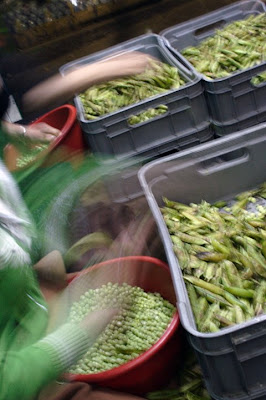It started raining on Sunday morning after Mass and did not stop until Wednesday night. I heard the storm had carried away the train tracks that used to link La Sabana Station with the rest of Cundinamarca region and that had been abandoned long time ago; the torrential rain also opened up the tombs in the Cementerio Central also emptied to turn the premises into a sort of cultural centre! A woman said that "a very persistent smell of the dead animals floating along streets horrified her but then, pregnant women are always imagining things..."
Sitting on a rocking chair in front of the old fireplace, which we'd only used the night the electricity went out, I began thinking about how long the heavy rain would last. I'd cancelled my last filming in Corabastos three times now due to the rain; today, however, my thoughts went to try imagining the coteros working under this weather... Hours were going by very slowly and I decided to make a film inside the house fearing at times that the water will start coming through the glass that covered the inner patio.
Whereas I was filming the rain pouring against the glass, I recalled the scenario of Corabastos, when I felt so overwhelmed by the chaotic movement of people, trucks, carts... lit by the street lamps. I thought of how I was going to be able to represent this place in my film. That evening, I came across a text on Buddhist tradition that gave me some ideas:
Beneath the world of phenomena, we believed, there lay a deeper, truer, and more real reality of physical laws expressible as formulae or as essential forms, a reality of which we mortals might only sense the projections. Everything else, but especially colour and the proximal senses of touch, taste, and scent, was epiphenomenal. It was not then sight as such which was feared so much as the temptation that sight evoked, the temptation to enter into dialogue with the phenomenality, the material textures of the world.
Whereas I was filming the rain pouring against the glass, I recalled the scenario of Corabastos, when I felt so overwhelmed by the chaotic movement of people, trucks, carts... lit by the street lamps. I thought of how I was going to be able to represent this place in my film. That evening, I came across a text on Buddhist tradition that gave me some ideas:
When the Buddha was still alive and living in Bihar, a young man was sent to make his portrait, despite the fact that painting had yet to be invented. When he arrived at the place where the Buddha was in meditation, our artist realised he had a problem: he was so overwhelmed bu his subject's enlightened glow that he could not look at him. But then the Buddha made a suggestion: "We will go down to the bank of a clear and limpid pool", he said helpfully, "and you will look at me in the reflection of the water". The found an appropriately limpid pool, and the man happily painted the reflection.
Beneath the world of phenomena, we believed, there lay a deeper, truer, and more real reality of physical laws expressible as formulae or as essential forms, a reality of which we mortals might only sense the projections. Everything else, but especially colour and the proximal senses of touch, taste, and scent, was epiphenomenal. It was not then sight as such which was feared so much as the temptation that sight evoked, the temptation to enter into dialogue with the phenomenality, the material textures of the world.


.jpg)























1.21.jpg)


1.19.jpg)



1.33.jpg)





